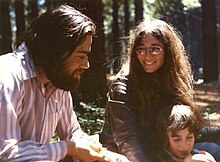Manuel Blum
Manuel Blum (Caracas, 26 April 1938) is a Venezuelan computer scientist who received the Turing Award in 1995 "In recognition of his contributions to the foundations of computational complexity theory and its application to cryptography and program checking".
Blum was educated at MIT, where he received his bachelor's degree and his master's degree in EECS in 1959 and 1961 respectively, and his Ph.D. in mathematics in 1964 supervised by Marvin Minsky.
He worked as a professor of computer science at the University of California, Berkeley until 1999. In 2002 he was elected to the United States National Academy of Sciences.
He is currently the Bruce Nelson Professor of Computer Science at Carnegie Mellon University, where his wife, Lenore Blum, and son, Avrim Blum, are also professors of Computer Science.
In the 60s he developed an axiomatic complexity theory which was independent of concrete machine models. The theory is based on Gödel numberings and the Blum axioms. Even though the theory is not based on any machine model it yields concrete results like the compression theorem, the gap theorem, the honesty theorem and the Blum speedup theorem.
Some of his other work includes a protocol for flipping a coin over a telephone, median of medians (a linear time selection algorithm), the Blum Blum Shub pseudorandom number generator, the Blum-Goldwasser cryptosystem, and more recently CAPTCHAs.
...
Wikipedia

